Choosing the Right Pet Parrot: A Complete Guide
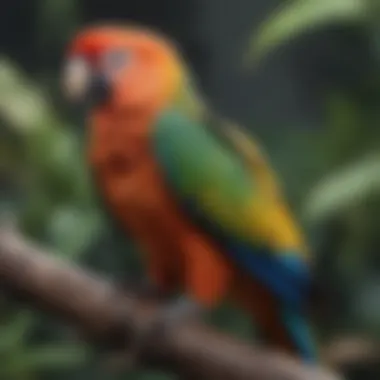
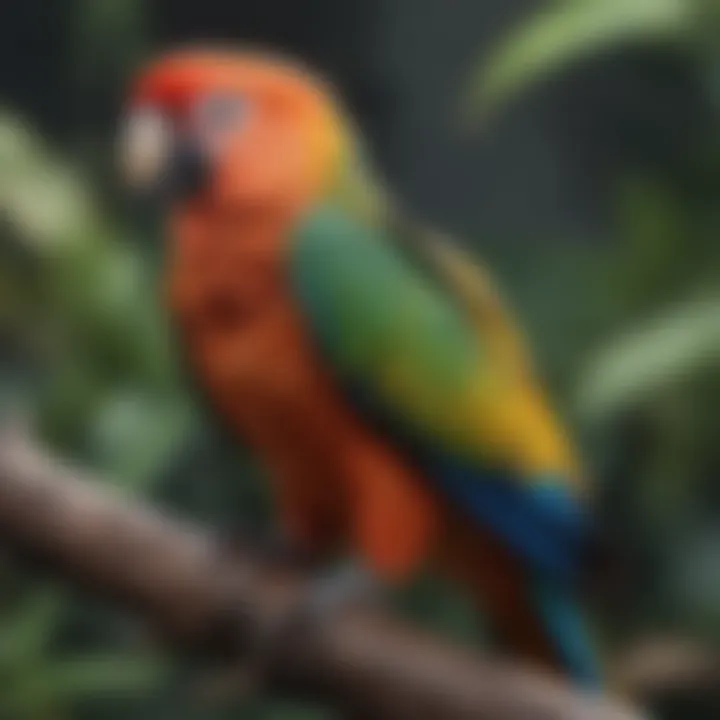
Intro
Choosing a pet parrot can feel like wandering through a dense jungle of options. With a cacophony of colors, sizes, and unique traits, prospective parrot parents face a multitude of choices that can be thrilling yet overwhelming. Each species not only showcases its own aesthetic appeal but also comes with its distinct set of needs and responsibilities. To be a successful bird keeper, it is crucial to dig deep into the factors that influence your decision, from understanding species-specific habits to evaluating one’s lifestyle against the demands of parrot care. This guide seeks to eliminate the guesswork, providing aspiring bird owners with essential information to make an informed choice and create a nurturing environment for their new feathered companion.
Let's embark on this journey and explore the intricate world of avian care, ensuring that both birds and their humans enjoy a harmonious and fulfilling life together.
Avian Care Basics
Understanding the fundamentals of avian care is paramount for any potential parrot owner. Birds are intelligent and social creatures, needing not just physical care but a mental and emotional understanding that caters to their specific species needs. Here’s a closer look at what every bird owner should know.
Importance of Proper Nutrition
A balanced diet is more than just bird seed from the pet store. Just like humans, parrot diets must encompass a variety of foods. Fresh fruits, vegetables, and fortified pellets are vital components. Nutritional imbalances can lead to serious health issues over time. Ideally, a parrot’s diet should include:
- Fruits: Apples, bananas, and berries provide essential vitamins.
- Vegetables: Leafy greens are crucial; think spinach and kale.
- Pellet Mix: High-quality pellets should comprise the bulk of their diet.
- Nuts and Seeds: Given sparingly, these are treats due to their high fat content.
Regularly updating their menu not only ensures health but also enriches the parrot's life by introducing new tastes and textures.
Understanding Bird Species and Their Needs
Not all parrots are created equal. Each species comes with its individual quirks and needs. For instance, a cockatiel may thrive in a smaller setting as they tend to be less boisterous, whereas an African Grey requires ample interaction and stimulation to prevent boredom.
Before bringing a parrot home, consider:
- Activity Level: Some species, like the Amazon parrot, are known for being more interactive while budgerigars can be easier to handle.
- Lifespan: Some parrots can live for decades, so it’s not just acquiring a pet; it’s a long-term commitment.
- Social Needs: Parrots that are less social might not do well if left alone for long periods.
Basics of Birds Habitat Setup
Creating an inviting habitat is foundational. Birds need freely available space to move. A spacious cage is crucial. Cages should be at least twice the wingspan of your parrot. Additionally, enrichment features such as perches, toys, and safe branching options are necessary to keep their mind active and body fit. A few pointers:
- Cage Location: Place it in a room with human interaction; parrots thrive on social contact.
- Cleaning: Regular maintenance is vital for hygiene. Bacteria can breed in neglected habitats.
Grooming and Hygiene Tips
Keeping your parrot clean is vital for their health. Regular grooming helps keep feathers in prime condition. Here are essential practices:
- Wing Clipping: Aids in safe flying indoors but is best discussed with an avian vet.
- Bathing: Some parrots love a good splash, while others may prefer a gentle misting.
- Nail Trimming: Essential, as sharp nails can lead to injuries.
Educating oneself about these fundamental aspects sets a solid foundation for nurturing a healthy relationship with your pet parrot.
Interacting with Your Pet Bird
A parrot isn’t just a pet; it’s a companion. Learning how to properly interact with your avian friend can lead to a satisfying bond, but this may need patience and understanding.
Building Trust and Connection
Establishing rapport with your parrot takes time. Simple gestures like speaking softly, and letting them observe you daily can create a sense of security. Try to avoid sudden movements, as these can startle them.
Training Techniques and Tips
Training isn’t just about tricks; it’s about ensuring your parrot understands commands and social cues. Use positive reinforcement methods to make it a rewarding experience.
Fun Activities for Bird Owners and Their Birds
Birds enjoy engaging playtime. Consider rotating toys frequently to keep their environment stimulating. Some enjoyable activities include:
- Interactive Toys: Puzzle-solvers can promote mental stimulation.
- Outdoor Time: Supervised outings can help them enjoy fresh air safely.
Recognizing Bird Cues and Behaviors
Understanding your parrot’s body language can tell you a lot about how they’re feeling. If a parrot is fluffed up and quiet, it may not be in the mood to socialize. Observing these cues allows for nurturing a good relationship.
Emotional Well-Being of Birds
Birds are social animals; neglecting their emotional needs can lead to behavioral issues.
The Role of Play and Socialization
Socialization prevents loneliness. Make time every day dedicated solely to interacting with your feathered friend. Regular playtime fosters better mental health.
Enhancing Birds' Emotional Health
Using various techniques to increase their emotional well-being will benefit both your parrot and you. Don’t overlook the power of routine, as it gives birds a sense of predictability and security.
Assessing Bird Stress and Remedies
Look out for signs of stress such as excessive feather plucking or screaming. These can indicate deeper issues. Providing a safe space, playtime, and mental stimulation can often help alleviate stress.
Building Strong Human-Bird Bonds
Time and patience are vital in developing a strong bond. Daily interactions help solidify trust, so stay committed.
Bird Health and Safety
Keeping your parrot healthy goes beyond keeping their feathers clean.
Common Health Issues and Prevention
Birds are prone to specific ailments such as feather plucking, respiratory issues, or obesity. Regular vet check-ups can catch many of these issues early.
Routine Veterinary Care
A good avian vet is indispensable. Routine check-ups ensure vaccinations are up to date and health is on track.
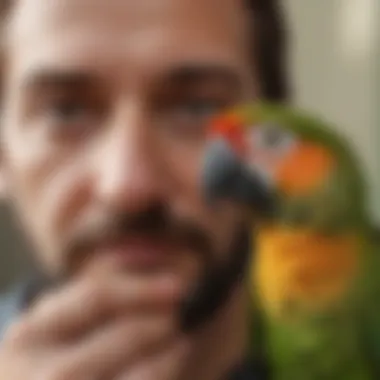
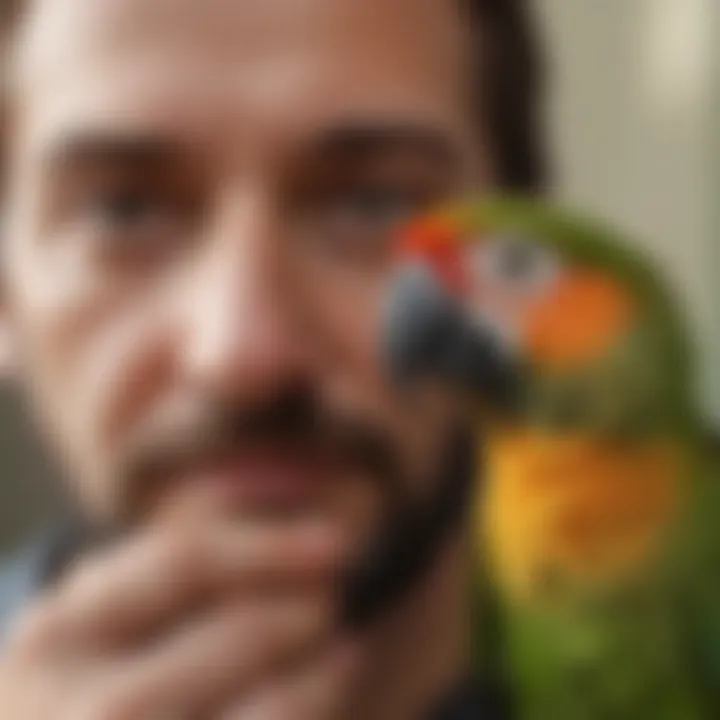
Environmental Hazards to Avoid
Always be aware of harmful elements in their environment. Common hazards include:
- Teflon: Cookware that's heated can create toxic fumes.
- Plants: Certain houseplants can be toxic to birds.
Signs of Illness or Distress
Have your eye out for lethargy, changes in appetite, or unusual behavior. Early detection goes a long way in effective treatment.
Fun Facts and Quirky Insights
Birds can be intriguing companions. Learning more about them enhances the experience.
Unique Traits of Popular Bird Species
Many popular breeds have remarkable abilities. For example, the African Grey is renowned for its mimicking ability, while the Macaw is known for its vibrant plumage and playful nature.
Historical and Cultural Significance of Birds
Throughout history, birds have held symbolic meanings. In various cultures, parrots symbolize communication and wisdom.
Famous Bird Owners and Their Stories
Several celebrities are known for their love of birds. For instance, renowned artists and musicians often carry their parrots, illustrating the bond shared between humans and these wonderful creatures.
In summary, owning a parrot requires commitment, knowledge, and love. Proper care and understanding ensure the best possible life for both you and your pet.
"A well-cared-for parrot is not just a pet; it's a cherished member of the family."
Equipped with the right information, you’re ready to embark on a rewarding journey with your feathered friend.
Understanding Parrots
In the world of companion animals, parrots often stand out for their vibrant plumage and exceptional vocal abilities. Yet, these captivating birds are more than just colorful decorations in a cage; understanding parrots is essential for any potential owner. This section sets the stage for delving into the complex nature of parrots, showcasing their diversity and the unique characteristics that come with each species. The more you grasp about these feathered friends, the more equipped you will be to choose a parrot that fits seamlessly into your lifestyle.
Diversity of Parrot Species
The variety of parrot species is astonishing, showcasing a rich tapestry of colors, sizes, and temperaments. From the tiny budgerigar to the grand macaw, each type brings its own charm and set of needs. In fact, there are about 393 species recognized, varying greatly in terms of behavior and care requirements.
- Small Parrots: Budgerigars are often the go-to choice for beginners due to their manageable size and social nature. They adapt well to smaller environments and require less space compared to larger species.
- Medium Parrots: Conures and Quakers can be lively and affectionate. They are often characterized by their playful demeanor, but they do require significant interaction.
- Large Parrots: Species like Amazons and Macaws are breathtaking in size and intelligence, needing vast spaces and time commitment from their owners. Their social needs cannot be overstated, as neglect can lead to behavioral challenges.
It’s vital to grasp the differences among these species, as each requires specific environments and social interactions. By understanding the variety, you ensure that you choose a parrot that matches not only your preferences but also your living situation.
Characteristics and Personality Traits
Parrots are known for their intricate personalities, intelligent behavior, and social needs. Recognizing these traits can significantly impact how well you connect with your new avian companion.
- Social Nature: Parrots are inherently social creatures. In the wild, they thrive in flocks. This means that if you choose to keep one, you should be prepared for an interactive pet that needs companionship, whether that's from humans or a mate.
- Cognitive Skills: Many parrots are remarkably intelligent. Some are capable of mimicking human speech and can even learn tricks. A parrot's ability to problem-solve can be a wonderful attribute but requires stimulation to avoid boredom.
- Affection Levels: While some species are naturally cuddly, others prefer to keep their distance. It's necessary to learn about a particular species's tendencies before jumping into ownership. This informs your expectations and helps foster a suitable bond, minimizing the chances of future conflicts.
In understanding these characteristics, prospective parrot owners can better assess if they are ready for the commitment. After all, adopting a parrot isn't just about picking a pretty bird; it's about integrating a vibrant personality into your life.
Assessing Lifestyle Compatibility
When one is on the journey of selecting a pet parrot, there's a critical factor that often sets the stage for a successful bird-owner relationship: lifestyle compatibility. The unique nature of parrots, not just as pets but also as companions, necessitates that potential owners reflect deeply on their daily routines, commitments, and environmental offerings. So, why is this compatibility so important?
First, let's think about time. Parrots are incredibly social creatures. They thrive on interaction, and without sufficient engagement, they can develop a range of behavioral issues. If one is frequently out and about or has an unpredictable schedule, this could lead to loneliness for the feathered friend. Additionally, understanding how much time you can dedicate to not just the fun antics, but also normal care routines like feeding, cleaning, and health monitoring is crucial.
Now, consider space. Different species come with different space requirements, and it's not just about square footage. Parrots need room to spread their wings—both literally and figuratively. A cramped environment can stunt their physical and psychological growth. Assessing your living space also plays into factors like noise levels. Some parrot species can be quite vocal, and if you live in a neighborhood that isn’t forgiving to noise, that’s a point to ponder.
Finally, we can’t overlook allergies. Feather dust can be a side effect of having a parrot in the house. This can be a troublesome issue for those with sensitivities. Evaluating if any family members are allergy-prone can prevent health complications later down the line.
In summary, assessing all aspects of lifestyle compatibility lays the groundwork for a healthy and satisfying companion relationship with a parrot. Taking a holistic approach to your daily life and environment, before bringing a bird into the equation, helps ensure both the individual and the parrot can thrive together.
Time Commitment for Care
Owning a parrot isn't just about having a beautiful, colorful creature around; it requires a serious investment of time. Daily interaction with your parrot isn't merely desirable—it's essential for their wellbeing. These birds are highly intelligent and social. They don’t like being ignored like some might overlook a sleeping cat. A few minutes of check-in only twice a day falls flat when it comes to parrots; they need quality time with their humans to stimulate their minds and form trusting bonds.
Some parrots require more attention than others. Larger breeds, like macaws, often demand more time and social interaction as compared to smaller varieties. That being said, it's always good to remember that smaller parrots still desire engagement, albeit in different ways.
Most parrot enthusiasts recommend spending at least two to three hours a day interacting with your bird; this can be through play, training, or simple chatting. Neglect can lead to behavioral challenges, which sometimes could spiral out of control.
Space Requirements for Different Species
Space is more than just a luxury for parrots; it's a necessity. The amount of territory you can allocate for a bird can significantly influence its mood and behavior. As mentioned earlier, different species have different spatial needs. For example:
- Budgerigars: These small birds can thrive in cages that are about 18x18x24 inches as long as they get daily out-of-cage time to fly and explore.
- Conures: Medium-sized conures need larger cages, ideally no less than 24x24x36 inches. They are playful and active, often requiring more room to play with toys.
- Macaws and Amazons: A sizable cage is key for larger parrots, sometimes needing 36x24x48 inches or more. These birds require significant room to move around and exercise.
Also, it’s vital to consider the arrangement of your living space. Parrots love to perch high up. A bird-safe space—one where your parrot can freely fly, explore, and engage—is paramount. The optimal living environment incorporates climbing structures and spaces for enrichment without being cluttered or dangerous.
Allergy Considerations
Sometimes overlooked, allergies can play a big role in deciding to invite a parrot into your home. Feather dust is a common byproduct of many parrot species, and this fine powder can trigger allergic reactions in some people. As tempting as it can be to think "we can manage it," it’s important to take allergies seriously.
Before choosing a parrot:
- Evaluate family health: If anyone in your household has respiratory conditions or allergies, consult with a physician.
- Consider breed selection: Some parrot species are known to produce less feather dust. Smaller species often produce less dust compared to larger ones, making them a better choice for sensitive family members.
- Utilize air purifiers: Having an air purifier can help mitigate the dust problem, but it shouldn’t be the sole approach. Regular cleaning of your space can lessen dust accumulation.
By understanding your own health situation and that of your family, you can make calculated decisions that prioritize everyone’s comfort while still embracing the joys of having a parrot as a companion.
"Compatibility isn’t just about matching personalities; it’s about meeting the needs and nuances of a living creature that depends on you to thrive."
Choosing the Right Species
When it comes to picking a pet parrot, one size certainly does not fit all. There are numerous species, each with unique characteristics, temperaments, and care necessities. Understanding these nuances is vital. Picking the right species ensures not only that the parrot thrives in your home environment but also that you, as a pet owner, are delighted with your feathered companion. It's about finding that perfect match, ensuring both you and the parrot can enjoy a harmonious relationship.
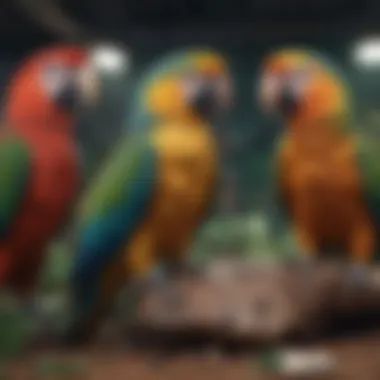
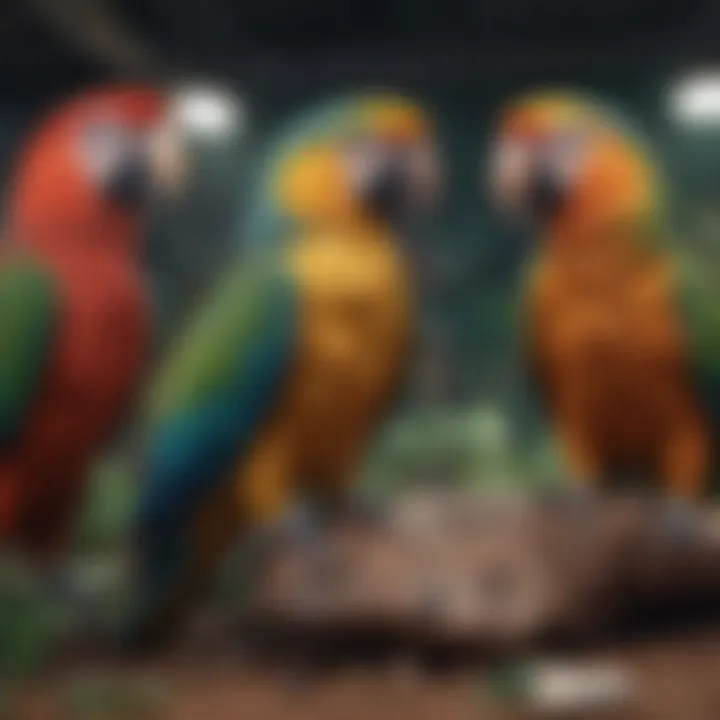
Choosing the right parrot species allows you to match lifestyle, space, and resources with the specific needs of the bird. For example, small parrots like Budgerigars may not require as much room as larger ones such as Macaws, yet they also have their personalities you must consider. By weighing these aspects thoughtfully, one can prevent overwhelming challenges in the journey of pet ownership.
Small Parrots: Budgerigars and Lovebirds
Small parrots can fit seamlessly into various living environments, making them appealing for many aspiring bird owners. Take Budgerigars, commonly known as budgies; they are not just pretty faces but also intelligent and curious creatures. They often exhibit playful personalities and can be surprisingly vocal, chirping happily throughout the day.
Lovebirds, on the other hand, are social little beings. They thrive on companionship, so it’s best to consider adopting them in pairs if you can. They enjoy interaction, which nurtures their playful and affectionate nature. For someone with limited time to dedicate each day, lovebirds may require particular attention for socialization, making this an essential factor to think through.
Medium Parrots: Conures and Quakers
Medium-sized parrots like Conures and Quakers present a vibrant option for potential pet owners. Conures are known for their boisterous and entertaining antics; they have a playful spirit that can light up any room. However, they’re also known to be quite demanding, requiring plenty of playtime and mental stimulation to keep their little minds from wandering into mischief.
On the flip side, Quakers are slightly more reserved but share a fondness for social interaction. They have a robust nature, which can translate into less demanding care routines than their Conure counterparts. However, they can be more vocal, and potential owners should be prepared for their charming yet sometimes noisy conversations. These characteristics make them a good fit for families who perhaps want a balance of lively engagement and moderate noise levels.
Large Parrots: Amazons and Macaws
When you delve into the world of large parrots, Amazons and Macaws take center stage. Amazons are lively characters known for their ability to mimic speech and their strong personalities. They thrive on social interactions and require fairly spacious environments. If one decides to select an Amazon, it's crucial to understand their vibrant lifestyles, as they don't take too kindly to boredom.
Meanwhile, Macaws are impressively striking with their colorful plumage and striking intelligence. They are known for their affectionate nature but also demand considerable time and space. Owning a Macaw can be akin to having a small child; they will demand attention and engagement, which is a significant commitment. But the rewards of such a bond can be substantial, with their charming nature quickly endearing them to their caregivers.
In summation, choosing the right species isn't merely about picking a pretty bird; it’s about fostering a mutually beneficial relationship where both bird and human can flourish. Take the time to consider your lifestyle, space, and the specific needs of different species before making your feathered companion choice. This way, the connection you develop will be rewarding and lasting.
Behavioral Considerations
Understanding the behavioral aspects of parrots is crucial when choosing the right pet. Not only do these magnificent birds have complex personalities and needs, but recognizing their behavior can significantly enhance the bond between the pet and owner. Behavioral considerations touch upon how a parrot interacts with its environment, its ability to learn, and its social requirements. Each of these elements plays a vital role in ensuring a happy and healthy home life for both the bird and its caregiver.
Socialization Needs
Parrots, inherently social animals, thrive in environments where they receive ample interaction and engagement. In the wild, these birds generally live in flocks, so being alone can be quite stressful for them. Consequently, understanding your parrot's socialization needs is paramount.
- Daily Interaction: Aim for meaningful daily interaction, not just feeding and cleaning the cage. This is when the relationship blossoms. Your parrot will grow to trust you more with consistent social interaction and bonding time.
- Exposure to Different People: Gradually introducing your parrot to various people can help it acclimate to different social settings. This helps to build confidence and reduces anxiety, making it a more enjoyable companion.
- Relationships with Other Birds: If you have multiple birds, ensuring they get along can also be beneficial. They often find comfort in one another’s presence, reducing loneliness and boredom.
Through attentive socialization practices, you will not only establish a solid bond but also contribute to the overall wellbeing of your parrot.
Cognitive Abilities of Parrots
Parrots are quite intelligent, displaying capabilities similar to that of a child under the age of five. They can solve problems, learn tricks, and even mimic speech to an astonishing extent. Appreciating their cognitive abilities makes it easier to provide appropriate enrichment and mental stimulation.
- Problem-Solving Skills: Many parrot species tend to figure out puzzles and challenges placed in front of them. Offering toys that promote this kind of thinking helps to keep their minds sharp.
- Learning New Skills: Parrots are quick learners. By employing positive reinforcement training techniques, owners can teach their birds commands or tricks fairly easily. This not only enhances the parrot's cognitive skills but strengthens the bond they share with the owner.
- Mimicry: Their ability to imitate speech is fascinating. Some owners find joy in teaching their parrots phrases or sounds relevant to their daily lives.
These cognitive traits necessitate an environment that encourages growth and learning, helping them to avoid boredom that may lead to unwanted behaviors.
Common Behavioral Issues
Despite their many delights, parrots can also showcase troubling behaviors if their needs are not adequately met. Recognizing these issues early on can facilitate corrective measures and improve overall harmony in the home.
- Biting: Commonly stemming from fear or territorial behavior, biting can be mitigated by nurturing trust and ensuring your parrot feels secure in its environment.
- Screaming: Parrots use vocalizations as a means of communication. Excessive screaming may indicate boredom or loneliness, highlighting the need for interaction and mental stimulation.
- Feather Plucking: A significant issue among pet parrots, feather plucking often arises from stress, boredom, or health issues. If this behavior is observed, it’s vital to consult a vet to rule out any medical concerns.
Addressing behavioral issues swiftly and compassionately is essential for both parrot and owner, fostering a respectful and fulfilling companionship.
Caring for Your Parrot
Caring for a pet parrot is more than just feeding them and changing their water. It encompasses a range of responsibilities that contribute to the overall health and happiness of these intelligent creatures. The importance of this topic cannot be overstated, as proper care lays the foundation for a thriving human-parrot relationship and ensures that these feathered companions enjoy a fulfilling life.
When you choose to bring a parrot into your home, you commit to providing a proper environment that includes adequate nutrition, mental stimulation, and health maintenance. This holistic approach allows for an engaging relationship with your pet and helps prevent common behavioral issues that might arise from neglect or misunderstanding. Additionally, caring for your parrot fosters a deep bond of trust, making them feel secure and appreciated within their living space.
Nutrition Requirements
The diet of a parrot is a pivotal aspect of its care. Proper nutrition contributes directly to a parrot's lifespan and vitality. Unlike cats or dogs, parrots have complex dietary needs that must be met to ensure they live long, healthy lives.
A balanced diet typically includes a variety of:
- Pellets: Formulated to provide essential vitamins and minerals. Look for high-quality brands like Harrison's or Kaytee, as they are widely appreciated among bird owners.
- Fresh fruits and vegetables: These should comprise a large part of their diet. Greens like kale, carrots, and broccoli are excellent choices, while fruits such as apples (without seeds), berries, and bananas can be offered as treats.
- Seeds and nuts: They can be included, but moderation is key due to their higher fat content. Consider safe options such as sunflower seeds or almonds.
It’s essential to keep fresh food available daily and remove any uneaten portions to avoid spoilage. Additionally, providing mineral blocks or cuttlebone can help maintain healthy beak growth.
Habitat Setup and Environment
Creating an appropriate habitat for your parrot is equally crucial. Parrots are social, energetic creatures that thrive in environments that mimic their natural habitats. Therefore, your setup must cater to their needs for space, stimulation, and safety.
- Cage Size: Ensure the cage is spacious enough for them to move around comfortably. A general rule of thumb is that it should be at least twice the wingspan of your parrot when fully extended. Look for cages with horizontal bars for climbing.
- Placement: Choose a location away from hot windows, drafts, or excessive noise. Parrots enjoy being part of the household, so a central location can help them feel included.
- Enrichment: Include toys, perches, and items they can safely chew on. Rotating toys regularly helps to keep their environment fresh and stimulating.
- Lighting: Natural sunlight is beneficial, but ensure they have access to shaded areas. You may consider a full-spectrum light if natural sunlight is limited.
By establishing an engaging and secure environment, your parrot will feel more at ease, and this will lessn any behavioral issues that often arise from boredom or fear.
Health and Wellness Maintenance
A key responsibility of parrot ownership includes regular health and wellness checkups. Given their unique physiology, parrots require proactive care.
- Regular Vet Check-Ups: It is vital to find an avian veterinarian to perform annual or bi-annual health assessments. Early detection is key in preventing diseases common among parrots.
- Signs of Illness: Be vigilant for any changes in behavior, eating habits, or droppings. For instance, fewer vocalizations can indicate stress or illness.
- Grooming: Regular nail trimming and the occasional bath are important aspects of care. Consider providing a shallow dish for water or gently misting your parrot during baths.
- Mental Health: Parrots are intelligent and need mental stimulation. Interacting with them daily and engaging them in play is essential for their emotional well-being.
Proper care encompasses providing a safe, stimulating, and healthy environment, allowing your parrot to flourish both physically and mentally.
By investing in proper nutrition, a suitable habitat, and health maintenance, you not only enhance your pet's quality of life but also promote a deeper, more enriching connection between you and your feathered companion.
Training and Enrichment
The interaction between you and your pet parrot goes beyond mere coexistence; it vaults into a realm of mutual understanding and enrichment. Training and enrichment play a pivotal role in cultivating a fulfilling relationship with your avian companion. Not only does proper training establish essential communication, but it also enhances your parrot's quality of life through mental and physical stimulation. In this section, we will delve deep into basic training techniques, ways to provide mental stimulation, and the value of interactive play and toys.
Basic Training Techniques
Training a parrot isn't just about teaching tricks or commands—it's about building a foundation of trust and understanding. The first step is consistency. If you ask your parrot to do something, be sure to use the same word or gesture each time. This helps them make connections more easily. Here are some basic techniques to consider:
- Positive Reinforcement: This is a highlight reel in the world of parrot training. Use treats, praise, or affection when your parrot performs desired behaviors. This encourages them to repeat those actions.
- Clicker Training: This involves a small device that makes a distinct sound, signaling to your parrot that they have done something right. Pair this with a treat and watch their enthusiasm grow.
- Short Training Sessions: Keep sessions brief—around 5 to 10 minutes—so that your parrot stays focused and engaged. Multiple short sessions throughout the day are more effective than one long session.
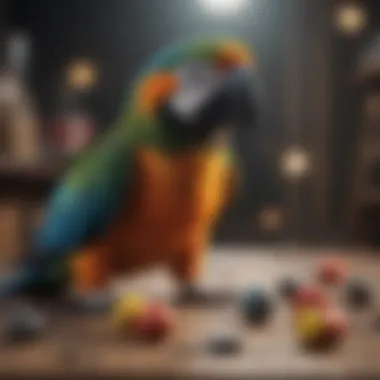
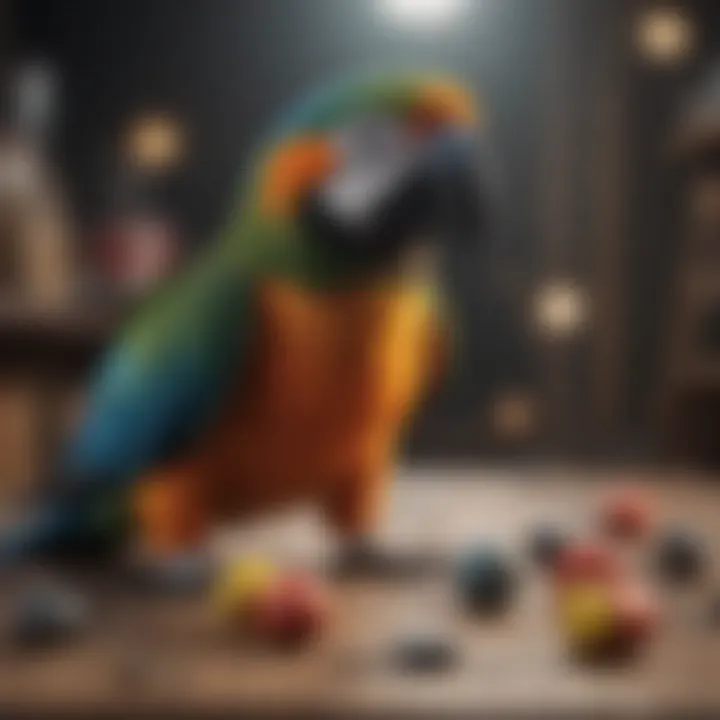
Remember, patience is crucial. A little persistence goes a long way, and you'll find your bird willingly responding in no time.
Providing Mental Stimulation
Parrots are intelligent creatures that can get bored quite easily. Mental stimulation is vital; it prevents behavioral issues born from boredom, such as screaming or feather plucking. Here are several ways to keep those little brains buzzing with joy:
- Puzzle Toys: Invest in toys that require problem-solving. These can include treat-dispensing toys or those that require manipulation to access hidden rewards.
- Training New Tricks: Always a great way to keep things fresh. Teach them new commands or tricks regularly; this not only engages them but also fortifies your bond.
- Foraging Activities: Encourage natural foraging behaviors by hiding food around their space, or by using foraging toys. This mimics their natural habitat and keeps them on their toes.
Not only does mental stimulation entertain your parrot, but it also ensures they enjoy their daily adventures to the fullest.
Interactive Play and Toys
Not all toys are created equal. To keep your feathered friend entertained and engaged, it’s essential to select interactive toys that encourage active play. These toys can foster creativity in your parrot and provide outlets for their energy. Here’s what to consider:
- Variety Matters: Offer a mix of ropes, swings, ladders, and puzzles. Different textures and shapes cater to their curiosity and natural instincts.
- Social Play: Ensure you engage with your parrot while they play. This could be as simple as providing a space for them to mimic your movements or using toys that require your participation, such as tug toys.
- Kill-Your_Devices: Rotate toys regularly. Parrots can lose interest in the same toy day in and day out; switching them up keeps things exciting.
Interactive play is not just fun; it's a way to form a stronger bond while ensuring your parrot leads a fulfilling life.
Emotional Bonding and Social Dynamics
When it comes to pet parrots, emotional bonding and social dynamics play a vital role in the overall well-being of both the bird and its owner. Understanding these elements can significantly enhance the quality of life for your feathered companion and foster a loving, enduring relationship.
Building Trust with Your Parrot
Building trust with your parrot is crucial. This process can take time, as each bird has its own personality. Some may be more timid, while others are outgoing. Start by creating a comfortable environment. Speak softly, use gentle movements, and avoid sudden gestures that can startle your parrot. Offering treats is a great way to earn their trust. A simple sprig of millet or a small piece of fruit can go a long way to win them over.
Patience is the name of the game here. You cannot rush trust. For instance, try sitting near the cage without reaching for them at first. Just be there, letting them observe you. Eventually, they may come closer, curious to interact. Remember, each moment counts in this delicate dance of building rapport.
Understanding Parrot Communication
Parrots communicate in various ways – through vocalizations, body language, and even facial expressions. Knowing how to interpret these signals can deepen your relationship. For example, a relaxed posture or fluffed feathers usually means they feel at ease. In contrast, flared wings or a raised crest can indicate excitement or agitation. Paying attention to these cues allows you to respond appropriately.
Vocalization is another significant aspect. Some parrots chatter when they are happy or just to get your attention. Others may mimic sounds and words you frequently use. True, it can be quite endearing when your parrot says "hello" or giggles back at you. Understanding when they are talking can help you engage with them better.
The Human-Parrot Relationship
The relationship many parrot owners develop with their pets is one of profound companionship. Unlike traditional pets, parrots have the ability to become interactive and engage in activities that are both amusing and rewarding. For instance, teaching a parrot to do tricks fosters a deeper connection. This could range from simple steps like flying to your hand to more complex tasks like ringing a bell or playing fetch.
Moreover, many people find that spending quality time with their parrot is rewarding. This could mean taking them out of their cage for social interactions, playing games, or simply enjoying each other's presence.
"A parrot's bond with a human can be years in the making, but the joy it brings is immeasurable."
In essence, the human-parrot relationship is unique because it thrives on emotional exchange. Engaging with your parrot holistically – through play, trust, and understanding – sets the foundation for a joyful partnership. As you navigate through this journey, remember that the special connection you achieve with your parrot will enhance your lives together.
Financial Considerations
When it comes to inviting a parrot into your life, the decision extends far beyond the mere thrill of companionship; it carries a hefty financial responsibility. Understanding the financial considerations associated with parrot ownership is crucial. These aspects encompass not only the price tag attached to purchasing the parrot itself but also the ongoing costs of care, unexpected emergencies, and planning for the future.
A well-rounded grasp of these factors can help prospective parrot owners avoid unforeseen expenses that could quickly spiral out of control. With the average lifespan of many parrot species ranging from ten to over fifty years, it's not merely a fleeting expense but a long-term commitment that requires budgeting and careful financial planning. This section delves into the specifics, ensuring that you're not caught off guard when it comes time to open your wallet.
Initial Costs of Ownership
Buying a pet parrot involves several upfront costs. To begin with, you’ll need to consider the purchase price of the bird, which varies significantly between species. For instance, a Budgerigar might set you back around $15 to $50, while a Macaw could cost thousands of dollars. Importantly, don't forget vital accessories such as a suitable cage, toys, food dishes, and initial veterinary checks.
In addition, you might want to factor in the following:
- Cage and Accessories: A durable cage designed for your parrot’s size can range from $100 to $500 or more. When selecting a cage, remember to think about the line of sight. Parrots are social creatures and they thrive when able to observe what is happening around them.
- Initial Veterinary Check-Up: A well visit may run between $50 and $150. A check-up helps ensure your bird is healthy and can provide insights into any immediate care needs.
- Food and Treats for the First Month: Quality parrot food can cost anywhere from $10 to $30 for a bag that lasts about a month, depending on the size of your bird and its dietary needs.
Taking these factors into account will provide a clearer picture of your initial financial commitment.
Ongoing Expenses for Care
Once you've welcomed your feathered friend home, the financial obligations hardly stop there. Ongoing expenses are pivotal to ensuring your parrot remains healthy and happy. Here's a look at some consistent costs you can expect:
- Nutrition: A varied diet is necessary. A monthly supply of fresh fruits, vegetables, and high-quality pellets can total $30 to $60.
- Routine Veterinary Care: Regular check-ups and vaccinations are necessary to prevent health issues. Expect to budget $50 to $300 annually.
- Toys and Enrichment Supplies: Parrots need stimulation to stay mentally healthy. This could add another $10 to $40 each month for toys and other interactive items.
- Utilities: The cost of heating and cooling your home can potentially increase, particularly in extreme weather. Keeping your parrot comfortable is essential for their well-being.
It's easy to see how these costs add up over time, so maintaining an accessible budget for ongoing expenses will save you from scrambling later on.
Emergency Financial Preparedness
Life can throw curveballs; pet ownership is no different. Emergencies might arise, and knowing you are prepared can ease the stress of an unexpected crisis. Consider allocating funds for potential veterinary emergencies, which can be quite substantial. Here are some points to ponder:
- Emergency Fund: Setting aside $500 to $1,000 specifically for sudden veterinary visits can act as a safety net.
- Pet Insurance: Some parrot owners opt for pet health insurance to help mitigate potentially significant costs. Premiums will typically range from $20 to $50 per month, depending on the coverage.
- Emergency Contact List: Maintain a list of veterinarians available after hours in case your parrot requires urgent care.
"Preparation is the key to success." Taking proper financial precautions can make the difference in ensuring your parrot receives care when it's needed most.
Overall, being aware of these financial considerations paves the way for a smooth parrot ownership experience, allowing you to focus on the rewarding aspects of having such an engaging companion.
Finale: Making the Right Choice
In the journey towards selecting a pet parrot, reaching a conclusion is akin to putting the finishing touches on a masterpiece. It's not merely about deciding which parrot to bring home; it encompasses evaluating how that choice aligns with your lifestyle, values, and hopes for companionship. Choosing the right parrot requires thoughtful contemplation, considering all the nuances discussed earlier in this guide.
The Relevance of Final Considerations
Making the right choice is essential, as it sets the stage for a harmonious relationship between you and your feathered friend. Each parrot possesses unique traits and requirements; hence, understanding their needs is crucial for ensuring their well-being. A mismatch can lead to frustration, for both the owner and the bird, which is an outcome that no one desires.
Think about the time and commitment needed for training and socialization. Many enthusiasts forget that parrots thrive on consistent engagement. It is their social nature that drives them to seek interaction, and without enough time spent together, their well-being can significantly diminish.
Benefits of Deliberation
Taking the time to evaluate different species, their care demands, and compatibility with your home environment can prevent future stressors. For instance, small parrots like Budgerigars might attract someone who desires lower maintenance, while larger species such as Macaws may suit someone looking for an enthusiastic companion.
"A well-informed decision can forge a bond that lasts a lifetime, filled with joy, trust, and mutual respect."
In addition to physical space and financial implications, emotional readiness is a key component. Understanding the emotional bonding required can help in creating a nurturing atmosphere where both the owner and the parrot can flourish.
Considerations to Keep in Mind
- Research Thoroughly: Each parrot comes with distinct personality and care needs. Look into the specific species that catch your eye.
- Evaluate Your Environment: Is your home suitable for the size and noise level of the parrot you're considering?
- Prepare for Long-Term Commitment: Parrots can live for decades. Reflect on your future before making a decision.
- Assess Affordability: Owning a parrot goes beyond initial purchase costs; consider ongoing expenses too.
In summary, making the right choice isn't about settling for a parrot; it’s an opportunity to welcome a lively companion into your life. It's a blend of passion, responsibility, and commitment. By adequately preparing and considering the numerous factors discussed, you will pave the way for a rewarding relationship with your avian friend.















